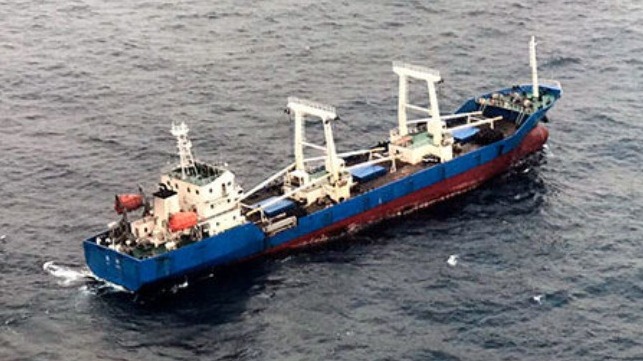Ecuador's navy is keeping a close watch on a 260-vessel Chinese fishing fleet that is currently operating in international waters off the coast of the Galapagos Islands.
"We are on alert, [carrying out] surveillance, patrolling to avoid an incident such as what happened in 2017," Ecuador's defense minister Oswaldo Jarrin told reporters at a press conference.
Chinese fishing practices caught the attention of the Ecuadorian public three years ago when a Chinese reefer was caught within the Galapagos Marine Reserve with about 6,000 frozen sharks - including examples of the endangered hammerhead shark. An analysis of AIS data by Global Fishing Watch and SkyTruth determined that the reefer in question rendezvoused with four Chinese longliners in the mid-Pacific prior to its detention, and it appears likely that the catch was obtained far outside of Ecuadorian waters.
- Chinese fishing flotilla in Galapagos accused of pretending to be in New Zealand
- Security leak reveals Chinese government surveillance of more ethnic minorities
- Why is the Five Eyes intelligence alliance in Beijing’s cross hairs?
- China 'deplores, rejects' statement from Five Eyes expressing concern at events in Hong Kong
Regardless of the cargo's source, the transportation of deceased sharks is illegal in the Galapagos, and in this case it proved to be unpopular as well as unlawful: the intercept prompted large protests outside the Chinese embassy in Quito. Ultimately, the Ecuadorian government fined the vessel $6 million and sentenced the captain to four years in prison.

“Unchecked Chinese fishing just on the edge of the protected zone is ruining Ecuador's efforts to protect marine life in the Galápagos,” said former Quito mayor Roque Sevilla, speaking to MercoPress.
To address the issue of international fishing pressure, Ecuadorian President Lenin Moreno proposed forming a regional environmental protection alliance with neighboring Latin American countries with Pacific coastlines, from Chile all the way to Costa Rica.
The Chinese distant-water fishing fleet is notorious for operating adjacent to (and sometimes on the shoreward side of) other nation's maritime boundaries. The zone just outside of Argentinian waters in the South Atlantic sees frequent confrontations between Chinese squid jiggers and Argentine Navy patrol vessels. In years past, several incursions resulted in warning shots and (in one case) an intentional sinking by cannon fire. Argentine forces still regularly report Chinese fishing vessels violating the nation's EEZ.
